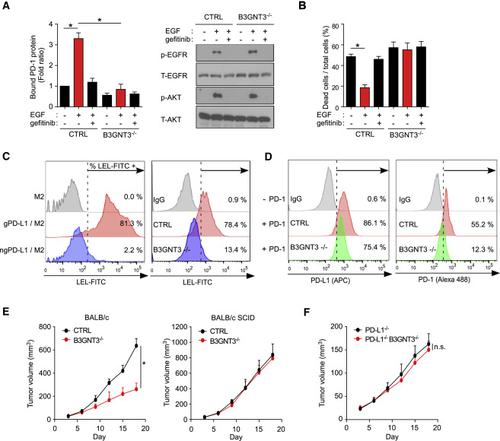当前位置:
X-MOL 学术
›
Cancer Cell
›
论文详情
Our official English website, www.x-mol.net, welcomes your
feedback! (Note: you will need to create a separate account there.)
Eradication of Triple-Negative Breast Cancer Cells by Targeting Glycosylated PD-L1.
Cancer Cell ( IF 48.8 ) Pub Date : 2018-02-12 , DOI: 10.1016/j.ccell.2018.01.009 Chia-Wei Li , Seung-Oe Lim , Ezra M. Chung , Yong-Soo Kim , Andrew H. Park , Jun Yao , Jong-Ho Cha , Weiya Xia , Li-Chuan Chan , Taewan Kim , Shih-Shin Chang , Heng-Huan Lee , Chao-Kai Chou , Yen-Liang Liu , Hsin-Chih Yeh , Evan P. Perillo , Andrew K. Dunn , Chu-Wei Kuo , Kay-Hooi Khoo , Jennifer L. Hsu , Yun Wu , Jung-Mao Hsu , Hirohito Yamaguchi , Tzu-Hsuan Huang , Aysegul A. Sahin , Gabriel N. Hortobagyi , Stephen S. Yoo , Mien-Chie Hung
Cancer Cell ( IF 48.8 ) Pub Date : 2018-02-12 , DOI: 10.1016/j.ccell.2018.01.009 Chia-Wei Li , Seung-Oe Lim , Ezra M. Chung , Yong-Soo Kim , Andrew H. Park , Jun Yao , Jong-Ho Cha , Weiya Xia , Li-Chuan Chan , Taewan Kim , Shih-Shin Chang , Heng-Huan Lee , Chao-Kai Chou , Yen-Liang Liu , Hsin-Chih Yeh , Evan P. Perillo , Andrew K. Dunn , Chu-Wei Kuo , Kay-Hooi Khoo , Jennifer L. Hsu , Yun Wu , Jung-Mao Hsu , Hirohito Yamaguchi , Tzu-Hsuan Huang , Aysegul A. Sahin , Gabriel N. Hortobagyi , Stephen S. Yoo , Mien-Chie Hung

|
Protein glycosylation provides proteomic diversity in regulating protein localization, stability, and activity; it remains largely unknown whether the sugar moiety contributes to immunosuppression. In the study of immune receptor glycosylation, we showed that EGF induces programmed death ligand 1 (PD-L1) and receptor programmed cell death protein 1 (PD-1) interaction, requiring β-1,3-N-acetylglucosaminyl transferase (B3GNT3) expression in triple-negative breast cancer. Downregulation of B3GNT3 enhances cytotoxic T cell-mediated anti-tumor immunity. A monoclonal antibody targeting glycosylated PD-L1 (gPD-L1) blocks PD-L1/PD-1 interaction and promotes PD-L1 internalization and degradation. In addition to immune reactivation, drug-conjugated gPD-L1 antibody induces a potent cell-killing effect as well as a bystander-killing effect on adjacent cancer cells lacking PD-L1 expression without any detectable toxicity. Our work suggests targeting protein glycosylation as a potential strategy to enhance immune checkpoint therapy.
中文翻译:

通过靶向糖基化 PD-L1 根除三阴性乳腺癌细胞。
蛋白质糖基化在调节蛋白质定位、稳定性和活性方面提供了蛋白质组多样性;目前尚不清楚糖部分是否有助于免疫抑制。在免疫受体糖基化的研究中,我们发现EGF诱导程序性死亡配体1(PD-L1)和受体程序性细胞死亡蛋白1(PD-1)相互作用,需要β-1,3-N-乙酰氨基葡萄糖转移酶(B3GNT3)三阴性乳腺癌中的表达。 B3GNT3 的下调可增强细胞毒性 T 细胞介导的抗肿瘤免疫。靶向糖基化 PD-L1 (gPD-L1) 的单克隆抗体可阻断 PD-L1/PD-1 相互作用并促进 PD-L1 内化和降解。除了免疫再激活之外,药物偶联的 gPD-L1 抗体还可诱导有效的细胞杀伤作用以及对缺乏 PD-L1 表达的邻近癌细胞的旁观者杀伤作用,且没有任何可检测到的毒性。我们的工作表明将蛋白质糖基化作为增强免疫检查点治疗的潜在策略。
更新日期:2018-02-13
中文翻译:

通过靶向糖基化 PD-L1 根除三阴性乳腺癌细胞。
蛋白质糖基化在调节蛋白质定位、稳定性和活性方面提供了蛋白质组多样性;目前尚不清楚糖部分是否有助于免疫抑制。在免疫受体糖基化的研究中,我们发现EGF诱导程序性死亡配体1(PD-L1)和受体程序性细胞死亡蛋白1(PD-1)相互作用,需要β-1,3-N-乙酰氨基葡萄糖转移酶(B3GNT3)三阴性乳腺癌中的表达。 B3GNT3 的下调可增强细胞毒性 T 细胞介导的抗肿瘤免疫。靶向糖基化 PD-L1 (gPD-L1) 的单克隆抗体可阻断 PD-L1/PD-1 相互作用并促进 PD-L1 内化和降解。除了免疫再激活之外,药物偶联的 gPD-L1 抗体还可诱导有效的细胞杀伤作用以及对缺乏 PD-L1 表达的邻近癌细胞的旁观者杀伤作用,且没有任何可检测到的毒性。我们的工作表明将蛋白质糖基化作为增强免疫检查点治疗的潜在策略。











































 京公网安备 11010802027423号
京公网安备 11010802027423号